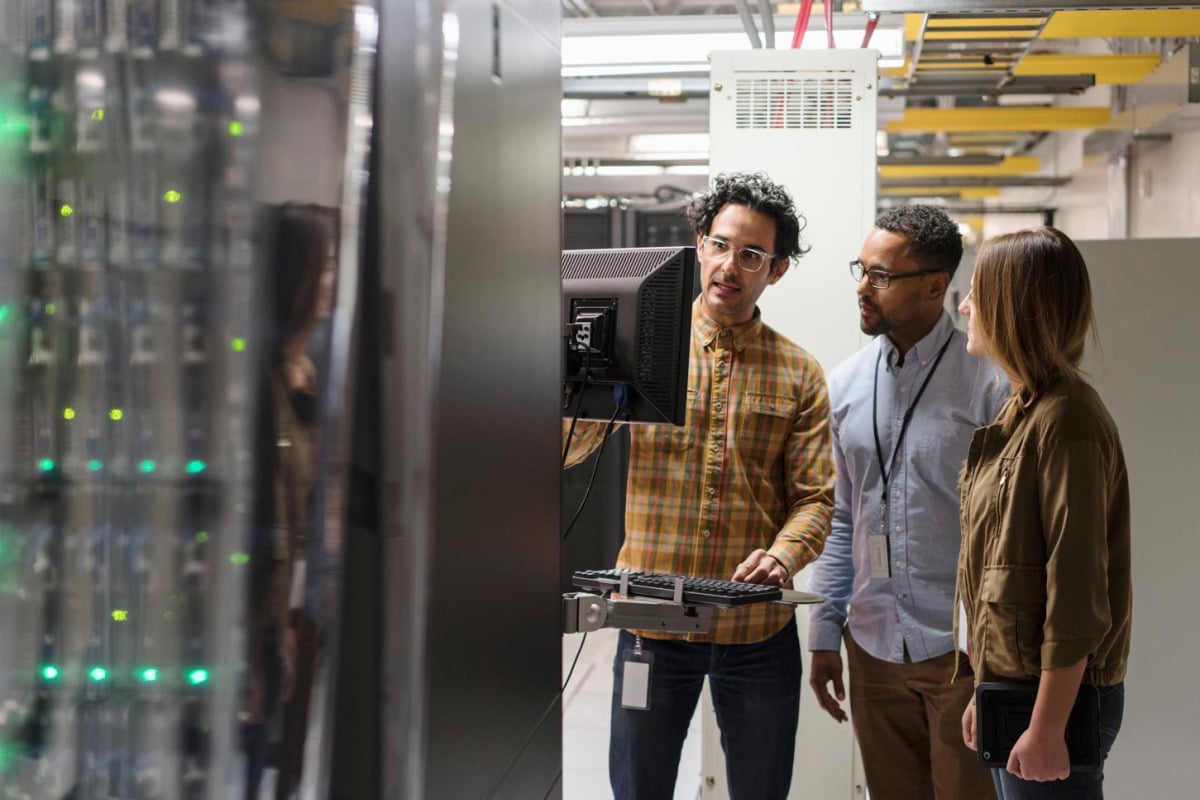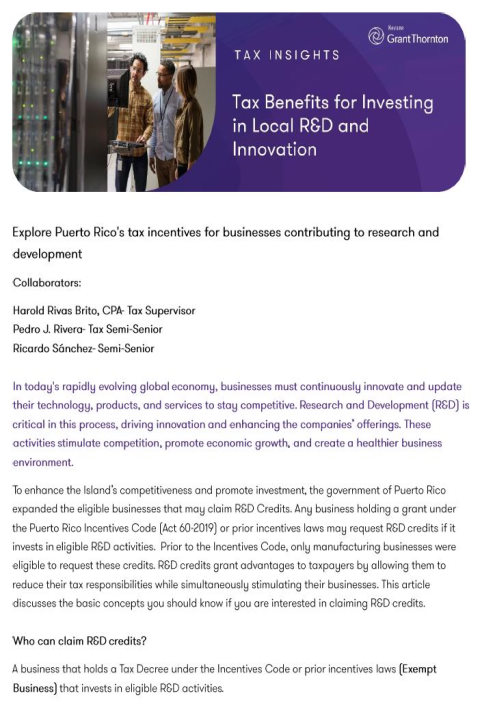
Collaborators:
Harold Rivas Brito, CPA, Tax Supervisor
Pedro J. Rivera, Tax Semi-Senior
Ricardo Sánchez, Tax Semi-Senior
Explore Puerto Rico's tax incentives for businesses contributing to research and development.
In today's rapidly evolving global economy, businesses must continuously innovate and update their technology, products, and services to stay competitive. Research and Development (R&D) is critical in this process, driving innovation and enhancing the companies’ offerings. These activities stimulate competition, promote economic growth, and create a healthier business environment.
To enhance the Island’s competitiveness and promote investment, the government of Puerto Rico expanded the eligible businesses that may claim R&D Credits. Any business holding a grant under the Puerto Rico Incentives Code (Act 60-2019) or prior incentives laws may request R&D credits if it invests in eligible R&D activities. Prior to the Incentives Code, only manufacturing businesses were eligible to request these credits. R&D credits grant advantages to taxpayers by allowing them to reduce their tax responsibilities while simultaneously stimulating their businesses. This article discusses the basic concepts you should know if you are interested in claiming R&D credits.
Who can claim R&D credits?
A business that holds a Tax Decree under the Incentives Code or prior incentives laws (Exempt Business) that invests in eligible R&D activities.
What is the R&D Tax Credit?
A non-refundable tax credit of up to fifty percent (50%) of the Special Eligible Investment made in Puerto Rico within the Taxable Year (Tax Credit).
What is the Special Eligible Investment?
The Incentives Code defines Special Eligible Investment as the amount of cash used by the Exempt Business, or any entity affiliated with the Exempt Business, in R&D Eligible Activities carried out in Puerto Rico during a taxable year. This cash can be sourced from the operations of the Exempt Business, U.S. government grants, and loans secured by the Exempt Business, its assets, its affiliates or its affiliate’s assets.
What qualifies as Eligible R&D Activities?
Eligible R&D Activities are activities aimed at advancing knowledge or capability in a field of science or technology through resolving scientific or technological uncertainties by an expert in the field. The new knowledge generated must be useful for creating new products, services, or processes of commercial value, or improving them. Eligible R&D Activities are categorized as experimental and incidental activities.
- Experimental activities: activities directly related to solving technical problems. It includes the design and testing of prototypes, the creation of new software, and the development of new processes.
- Incidental activities: include any ancillary activities that support the experimental R&D activities. For example, planning activities to identify scientific uncertainty, evaluating technical or scientific feasibility, and defining the scientific objectives of the project.
R&D activities conducted as a service or benefit for a third party are not eligible for the Tax Credit.
What are eligible R&D expenses?
Eligible R&D Expenses are those expenses directly related to the Eligible R&D Activities, limited to the following:
- Operational expenses – Specifically limited to payroll (salary, fringe benefits, and bonuses), insurance premiums, payroll taxes, municipal license, other licenses, net utility expenses, materials, depreciation or rent of the real estate exclusively used for the R&D project, repairs, rent or depreciation of machinery and equipment exclusively used for the R&D project, professional services, and specialized training. Such expenses are subject to the following limitations:
-
Experimental activities performed in Puerto Rico: if related to the experimental activities performed in Puerto Rican soil, they are not subject to limitations.
-
Experimental activities performed outside of Puerto Rico: if they are related to overseas experimental activities, the amount cannot exceed 20% of the total experimental expenses for activities performed in Puerto Rico.
-
Incidental activities: irrespective of where incidental activities are performed, these expenses cannot exceed 20% of the total expenses for experimental activities performed in Puerto Rico.
-
- Capital Expenses:
-
Physical Facilities - The acquisition, construction, or improvement of physical facilities, as long as the facilities are used exclusively for Research and Development projects for a minimum period of fifteen (15) years.
-
Machinery and Equipment1 – Expenses related to the purchase of qualified machinery, equipment, and instrumentation will only be covered if these assets will be used exclusively for R&D throughout their useful life. Otherwise, only depreciation costs may be claimed, allocated over the time during which the assets were used for R&D work.
-
- Intellectual Property1 – Expenses related to the acquisition of intellectual property will only be covered if this asset will be used exclusively for R&D over the useful life of the asset. Otherwise, only amortization costs may be claimed and allocated over the time during which the asset was used for R&D work.
1 meaning: These two R&D eligible expenses are mentioned in administrative provisions in the agency's official documents.
What expenses are ineligible?
Expenses related to the following activities, among others, would be deemed ineligible for R&D purposes:
- Quality control or inspection of a manufactured product or process
- Adaptation of a product, process, or service to the specific needs of a client
- R&D activities directed toward the creation or improvement of a Product, Process, or Service for a single client instead of a market;
- Market and marketing testing
- Research funded through a grant, agreement, or some other means by another person or government entity of Puerto Rico, including municipalities, municipal alliances, alliances between the private sector and academia and/or non-profit organizations
- The compilation of information or other content which, by itself, is not R&D;
- Design activities that do not directly contribute to the resolution of scientific or technological uncertainties
- Activities aimed at improving the cosmetic appearance of a Product
- The maintenance phase in the Software Development Lifecycle
In addition, the following expenses have been excluded from the Special Eligible Investment definition:
- Depreciation if this Tax Credit has been claimed for the acquisition or construction of physical facilities
- Those expenses paid using Tax Credits previously generated
- Any expense incurred in R&D activities carried out by contract for the benefit of a third party. However, capital investments in real estate, machinery, equipment, and instrumentation will only be considered as such if they are intended to expand the services offered to new foreign markets
What are the requirements to request the R&D Credits?
Any Exempt Business interested in claiming R&D Tax Credits must submit an R&D application to request the Department of Economic Development and Commerce of Puerto Rico (DEDC) to certify that the R&D activities made during the year are eligible for the R&D Tax Credit. The Exempt Business must accompany this application with an Agreed Upon Procedures report prepared by a Certified Public Accountant with a current license in Puerto Rico, validating the expenses included in the application. Upon reviewing and approving the request, the DEDC issues an Accreditation Certificate.
Another requirement imposed by Act 60-2019 to propel continuous R&D investment is that the Exempt Business reinvest an amount equal to the Tax Credits granted into R&D activities in Puerto Rico.
How is the R&D Credit used or transferred?
The tax credit can be used in two or more installments. Only the first half of the credit can be claimed during the taxable year the Exempt Business receives its Accreditation Certificate, with the remaining amount available for future years until fully exhausted. The credit can offset up to 100% of the business’s tax liability. As a general rule, the tax credit does not generate a refund.
The Tax Credit may also be assigned, sold, or transferred on the secondary tax credit market. Any cash considerations or property received will be excluded from taxable income if the Tax Credit is sold. The buyers of the Tax Credits may use them to offset up to 100% of their tax liability and are exempt from the gain created by the difference between the amount of the Tax Credit and the amount paid for it. This makes it an attractive transaction for buyers and sellers of Tax Credits.
Bottom Line
Within the Incentives Code, Puerto Rico provides an expansive menu of tax benefits that can be used for the continued development of the covered industries. If strategic planning is employed, the continuous research and development of the product or industry in question can be maximized, perhaps leading to the creation of a novel product or industry, which could give the business the option of applying for additional incentives and benefits.
Keep in mind that the use of R&D tax credit as a strategy during tax planning can lead to a lower tax obligation and provide better cash flow management. This, in turn, can lead to greater investment in the products and services offered by the business that will help maintain your competitiveness in a world always moving forward.
Be advised that this article considers the SUT implications of warranty contracts according to the Code and its regulations. For specific legal advice or assistance regarding other topics related to warranty contracts in Puerto Rico, we recommend consulting with a local attorney who specializes in consumer protection law.
We are committed to keeping you up to date with all tax-related developments. Please contact our Tax Department, should additional information be required regarding this or any other tax issue. We will gladly assist you!


